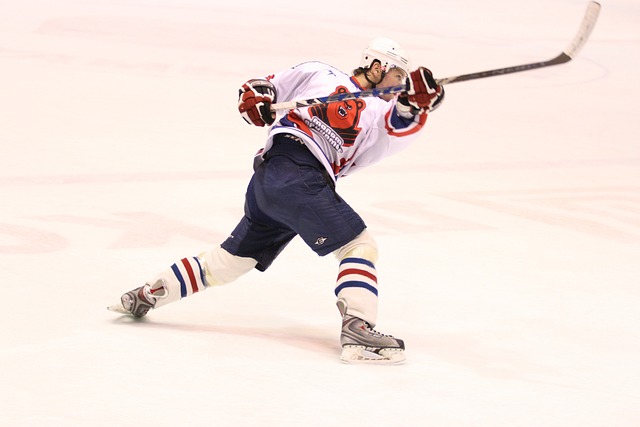It’s the final match. The official scouts are in the stands. The tension in the crowd is palpable. The speakers blare a distorted version of AC/DC’s “Highway to Hell.” Three goals to three. I glance up briefly at the scoreboard: 45 seconds in bright red letters. We’re three men against five. Two penalties in progress. Forty-five seconds left to score and win—or not. And for me, to be scouted—or not.
The puck drops, and a bead of sweat rolls from my forehead onto my lashes. I can feel its exact path; my senses are on high alert. It stings my eyes and momentarily blurs my vision. I shake my head and get into position, legs slightly apart, stick on the ice, facing off against my opponent.
My blood pounds in my ears. Schhuu! Schhuu! Schhuu! The referee is about to drop the puck. Pa-boom! Pa-boom! Pa-boom! My heart pounds in my chest. My legs ache from all the pushing, skating for speed, sharp turns, and emergency stops. My ankle injury flares up—a sharp pain shoots from the side of my ankle to my calf. I’ll pay for this tomorrow. I’m breathing hard and fast. Chipp, pffou, chipp, pffou, chipp, pffou!
I lift my gaze and meet the icy gray eyes of my opponent. They’re as clear as the frozen water beneath my feet, and just as cold. He’s not going to back down. A chill runs down my spine. Adrenaline. My body is ready.
The referee blows the whistle and drops the puck. Game on! I grab the rubber disc, pivot, and accelerate toward the net. I lift my head, scanning around me while zigzagging to evade my pursuers, trying to outpace them if I can.
My trajectory unfolds in my brain instantly and automatically. I don’t need to think; I act.
I look for the best-placed teammate to receive the puck. I can’t pass to Jacques; he won’t be able to keep up. I need to advance further. Maybe William? I sense him positioning himself, anticipating the puck in case I decide to pass instead of risking losing it. William always anticipates. I smile inwardly for a second—he’s a solid teammate.
Decision made. My blades dig into the ice, and my body pivots. I instantly spin 320 degrees to the left with agility. I feel the speed of my move in the twist of my knees, hips, and ankles.
One push, and I’m launched full speed in the opposite direction. I don’t even have to think about it; my brain commands, and the rest of my body obeys. I’m a well-oiled machine. My movements are the perfect expression of training and countless repetitions.
Everything hurts, but I feel alive, exhilarated.
I dodge around number 37 as he falls. I race behind the net. Left, right, I push the puck forward. An opponent comes straight at me, trying to block me. I handle the puck with precision—it’s an extension of my stick, an extension of my hand. As if wanting to cooperate, it slides neatly between my opponent’s legs. His stick crosses into the path of my skates—I jump over it, regain control of the puck, stop short, and pivot 90 degrees. He didn’t stop me. Phew! The tension ratchets up another notch inside me. I hear the crowd roaring, “Go! Go! Go!” I can do it; I have to do it.
My breathing is frantic. For a moment, I fear running out of oxygen; my muscles demand more and more to fuel power and speed. I circle the net again. A player tries to body-check me into the boards. I duck and accelerate. Behind me, I hear the telltale “boom!” of someone slamming into the barrier after missing his hit.
I scan for my teammates as I skate, but no one can help me. A defender is on each of them. If I pass the puck, I’ll lose it, and we’ll lose the game. I’m alone.
The crowd screams, pounding on the plastic boards surrounding the rink. An opening in the goal line. I make my move. I go all in, full speed. The opposing goalie sees me coming. I can do this—I can go a bit farther and take the shot. I push my legs one last time.
I shoulder-check number 12 hard as he comes at me. The contact is violent, but I hold my ground. I don’t lose the puck or my balance. Skating with every ounce of energy I have left, I stop two meters from the net. My blades screech, spraying a shower of powdered ice. My ankle protests under the strain, but I ignore it. The opposing defense hasn’t had time to regroup. I lift my stick and swing with all my strength.
I see it as if in slow motion—the puck skimming past the goalie’s shoulder. The buzzer sounds just as the puck hits the back of the net. Goal! I’ve scored.
The crowd goes wild, screaming with excitement. The first notes of Queen’s “We Are the Champions” echo through the arena. My teammates rush toward me, lifting me up and tossing me in the air. When I land, I glance at the stands. My eyes lock with the scout’s. He nods subtly.
That’s enough. I know now—I’ve been scouted.
“Open your eyes, breathe,” says Julie, our mental coach. The visualization exercise is over.
I scan the locker room. All my teammates wear focused expressions. One minute to the game. I take a deep breath.
The door swings open, and our coach steps in.
“Alright, guys, it’s time—kill them on the ice!”
I stand, grab my stick, and walk out, determined. Onward to victory.
Rose Lorang

